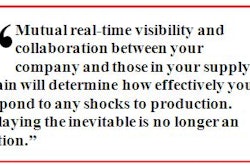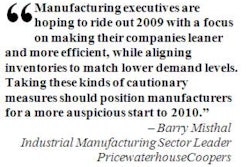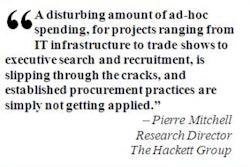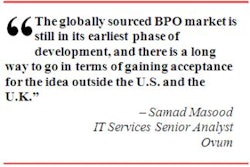May 11, 2009 — Last week one of the leading industry blogs in our space, Spend Matters, published a "Friday Rant" that described what it called "lazy reporting" on the part of this magazine. The accusation stemmed from an article that appeared on SDCExec.com, in which CVM Solutions described a study that appeared to show that "Fortune 500 companies are doing business with a surprisingly small number of common suppliers." The point of the study was to suggest that a failure of one supplier could have a "ripple effect" across many companies' supply chains. In the article, which reprinted a press release from CVM, Mickey North Rizza, research director at AMR Research, suggests, "Additional measures and due diligence are needed in today's economic turmoil to identify in advance suppliers at risk in a multi-tier supply chain."
In its posting on the story, Spend Matters scores CVM for basing its conclusion on an analysis of data from a sampling of 89 of the Fortune 500 companies. Spend Matters goes on to suggest that this magazine practiced "lazy reporting" for not delving deeper into the study with CVM and reporting on the methodology behind the study.
In fact, I had spoken with CVM about the study, and we discussed the methodology. While the results as reported in the press release were preliminary in nature, to my mind they seemed to illustrate a worrisome issue that has been widely discussed in light of the auto industry's travails – that is, that multiple interconnected supply chains could be vulnerable to disruption from the failure of a single vendor.
This also underscored an issue that has been discussed more broadly within the supply management space, that of supplier risk management in turbulent economic times and the need for Sourcing and Procurement staff to take a close look at their supply base, understand which suppliers are at risk, and take action to mitigate that risk. Since the economy took a nosedive in the latter part of last year, I've spoken with a number of supply management executives who have expressed concerns in this regard and were taking action to mitigate supplier risk, and therefore it seemed that this particular announcement from CVM would serve as a useful reminder for our readers of the urgency of the issue. In this instance, I made the editorial judgment that the forest was more important than the trees, and I focused on the broader strategic issue raised by the announcement rather than on the details of the methodology behind the study.
I would have been happy to discuss that decision with Spend Matters had they contacted me in regard to the article. Alas, I was not contacted. Which is surprising, given that the author of the blog goes to such lengths to extol his journalistic background. Perhaps contacting "the accused" to discuss the accusations has not fallen within his journalistic practice or his definition of good journalism – and if so, so be it. It's his blog, it's a free country, and he is free to express whatever opinions he sees fit to offer.
Expressing opinions, of course, is not, per se, journalism. Nor does operating a blog, per se, make you a journalist. Sometimes, in fact, it just makes you a guy with a computer, a domain name and an ego.
Andrew K. Reese is editor of Supply & Demand Chain Executive.
Got an opinion? Feel free to write me at [email protected].
In its posting on the story, Spend Matters scores CVM for basing its conclusion on an analysis of data from a sampling of 89 of the Fortune 500 companies. Spend Matters goes on to suggest that this magazine practiced "lazy reporting" for not delving deeper into the study with CVM and reporting on the methodology behind the study.
In fact, I had spoken with CVM about the study, and we discussed the methodology. While the results as reported in the press release were preliminary in nature, to my mind they seemed to illustrate a worrisome issue that has been widely discussed in light of the auto industry's travails – that is, that multiple interconnected supply chains could be vulnerable to disruption from the failure of a single vendor.
This also underscored an issue that has been discussed more broadly within the supply management space, that of supplier risk management in turbulent economic times and the need for Sourcing and Procurement staff to take a close look at their supply base, understand which suppliers are at risk, and take action to mitigate that risk. Since the economy took a nosedive in the latter part of last year, I've spoken with a number of supply management executives who have expressed concerns in this regard and were taking action to mitigate supplier risk, and therefore it seemed that this particular announcement from CVM would serve as a useful reminder for our readers of the urgency of the issue. In this instance, I made the editorial judgment that the forest was more important than the trees, and I focused on the broader strategic issue raised by the announcement rather than on the details of the methodology behind the study.
I would have been happy to discuss that decision with Spend Matters had they contacted me in regard to the article. Alas, I was not contacted. Which is surprising, given that the author of the blog goes to such lengths to extol his journalistic background. Perhaps contacting "the accused" to discuss the accusations has not fallen within his journalistic practice or his definition of good journalism – and if so, so be it. It's his blog, it's a free country, and he is free to express whatever opinions he sees fit to offer.
Expressing opinions, of course, is not, per se, journalism. Nor does operating a blog, per se, make you a journalist. Sometimes, in fact, it just makes you a guy with a computer, a domain name and an ego.
Andrew K. Reese is editor of Supply & Demand Chain Executive.
Got an opinion? Feel free to write me at [email protected].












